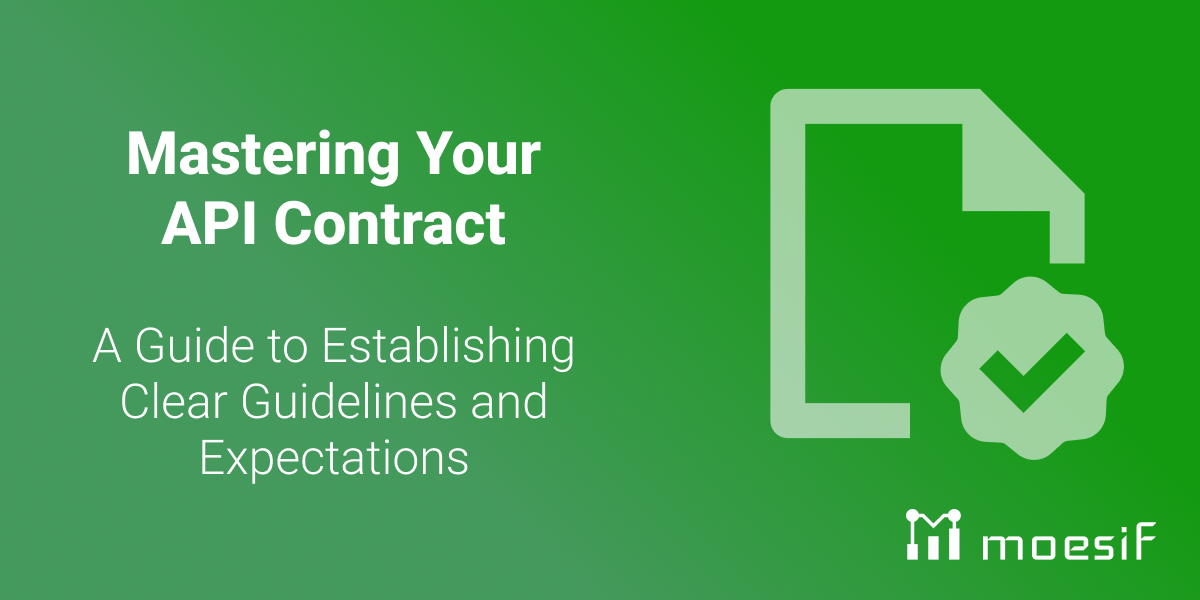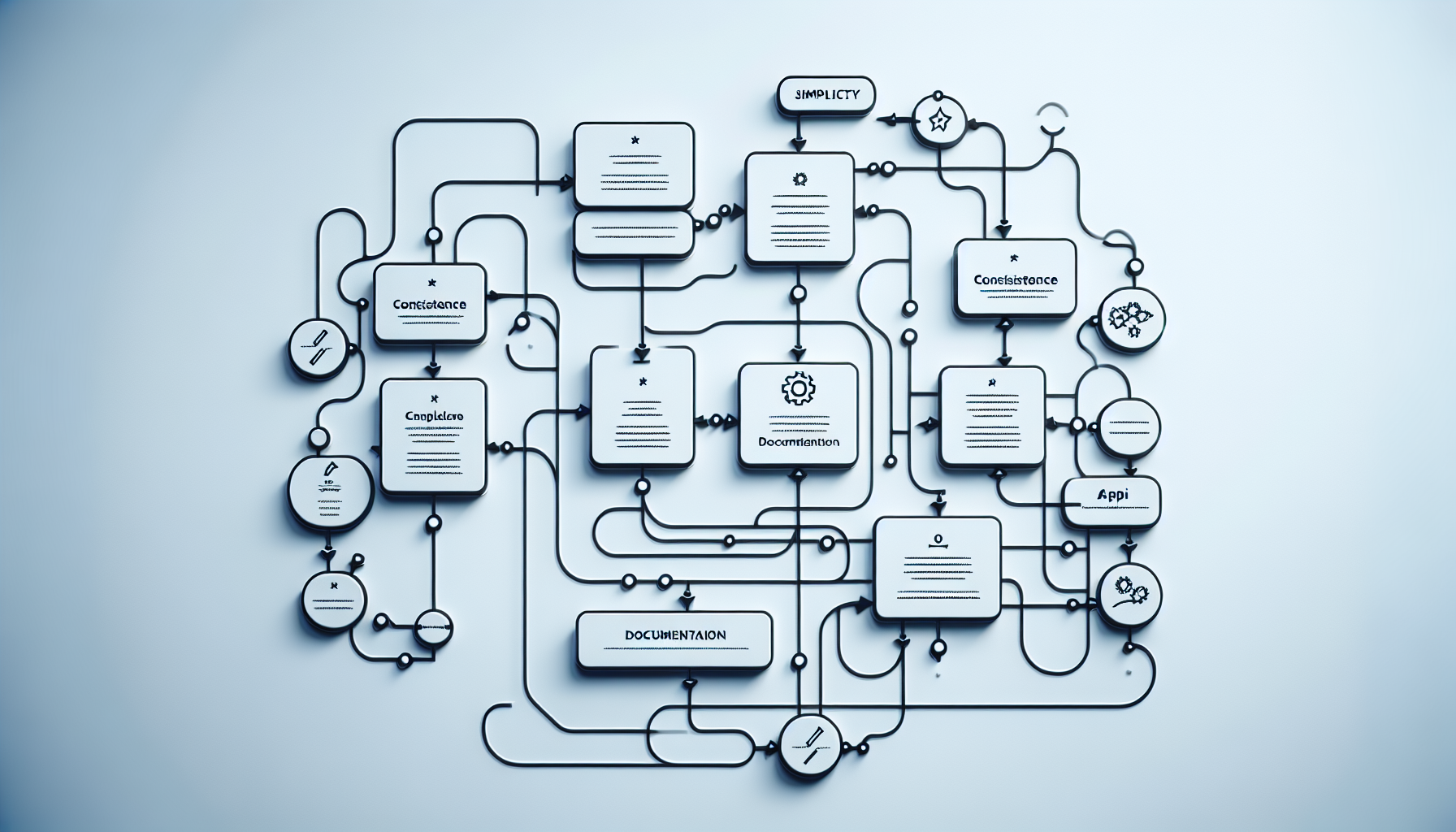Mastering Your API Contract: A Guide to Establishing Clear Guidelines and Expectations

Are you seeking to ensure robust communication between APIs and applications? Contract testing plays a crucial role in ensuring this robust communication. The key lies in the API contract. Serving as a definitive guide, API contracts align expectations, prevent errors, and cement the reliability of software interactions. This article breaks down the ‘how’ and ‘why’ of API contracts, including creation, benefits, and maintenance strategies for developer and consumer success.
Key Takeaways
- API contracts are critical formal agreements that define exact rules and requirements for programmatic interactions between software components, which include endpoint behavior, data formats, authorization mechanisms, and error handling, thereby enhancing security, reliability, and developer experience.
- Key practices in crafting effective API contracts are using clear naming conventions, documenting data structures and limitations, and incorporating security and compliance measures to prevent misuse and facilitate secure, predictable software integration.
- Automation of API contract management and testing, as well as integration with CI/CD tools, is essential for maintaining consistency, improving productivity, and ensuring that API behaviors remain aligned with the contract specifications throughout the software development lifecycle.
- Contract testing is crucial in maintaining API functionality and preventing failures.

The Significance of API Contracts
Successful API integration hinges on API contracts, which establish clear interaction rules that boost user experiences and expedite development. They define essential interaction protocols between providers and consumers, ensuring clarity and stability for software integration. This clear delineation of interaction rules and data misuse prevention contributes significantly to the security and dependability of systems. Additionally, contract testing plays a crucial role in enhancing the security and dependability of systems.
Within app development, API contracts perform a critical function. They assist app developers in establishing a clear framework for data access and interaction, cementing their importance in modern app ecosystems. Essentially, the power of an API lies in its contract - a well-designed contract is a recipe for success.
Role of API Contracts
API contracts are formal agreements that delineate rules and requirements for programmatic interactions. They showcase the expected behavior of the API and its endpoints, providing details on the following:
- how an application will interact with the API
- the data formats and structures that will be used
- the authentication and authorization mechanisms that need to be implemented
- the error handling and response codes that will be returned
- contract testing is a crucial aspect
This standardized interaction with other systems promotes shared understanding, making the API contract a key document for both internal and external API users, serving as a formal agreement and including a service-level agreement.
As a blueprint, the new contract establishes the relationship between the API provider and the consumers, guaranteeing that expectations are understood by all parties. It’s like an instruction manual for a new appliance, detailing how the API works and how to get the best results from it.
Benefits of API Contracts
API contracts offer a lucid, structured approach to API integration through the use of an application programming interface. This approach aids in the construction of reliable and efficient applications that offer an exceptional user experience. They lay the groundwork for extensive API documentation, simplifying the adoption process for developers and fostering an environment for efficient API usage.
Furthermore, it’s imperative to conduct API contract testing to affirm the functionality of APIs, maintain consistency in communication between software components, and avert failures. Contract testing helps maintain consistency and prevent failures by ensuring that all interactions between services are correctly defined and adhered to. Simply put, a well-defined API contract is a developer’s best friend – it reduces ambiguity, provides clarity, and ensures smooth and efficient interaction between different systems.
Creating an Effective API Contract

Crafting an effective API contract demands a delicate equilibrium of simplicity, consistency, and comprehensive documentation. API contracts serve as development guidelines that promote coding consistency and ensure the smooth interfacing of disparate systems.
To establish an effective contract, API design best practices recommend:
- Using descriptive and consistent naming conventions for endpoints and parameters
- Documenting data formats, limitations, and restrictions in an API contract
- Helping API users understand return types, input expectations, and constraints such as rate limits and availability schedules
- Implementing contract testing to ensure the API meets specified requirements and functions correctly.
Defining API Behavior
API contracts should unambiguously layout API usage, encompassing the specifics of endpoints, parameters, and expected response structure. This promotes appropriate integration and interaction between the API and its consumers.
Effective API contracts predefine error codes and success indicators, ensuring users understand potential failures and can handle errors appropriately, as well as recognize successful interactions. They need to lay out detailed utilization instructions, such as data normalization procedures, constraints around rate limits, availability, and other operational details to prevent misuse and optimize the API consumer experience for API consumers. An essential aspect of these contracts is the clear definition of error response, which allows API consumers to manage and troubleshoot issues effectively. Contract testing is crucial in ensuring users understand potential failures and handle errors appropriately.
A prime example of well-documented API practices is Stripe’s API, which uses standard HTTP response codes and provides usage examples for different programming languages.
Establishing Data Formats and Standards
API contracts ought to record data types, formats, and limitations, vital for outlining the structure and scope of the involved data entities. By documenting these peculiarities and formats, API users gain a clear understanding of return types, input expectations, and how to effectively interact with the API.
This detailed, machine-readable documentation ensures a shared understanding between the API provider and the consumer, making the data exchange process precise, predictable, and efficient. It’s like speaking the same language – when both sides understand the format, the communication becomes seamless. Additionally, contract testing ensures the data exchange process is precise and predictable.
Incorporating Security and Compliance Measures
API contracts need to be defined:
- Who has access to the API
- The manner of access
- Authorization processes
- Request limits
- Usage Restrictions
To ensure a smooth and efficient integration, an API contract needed should address these key aspects.
This fortifies security measures and wards off unauthorized usage, ensuring compliance and system resilience, thus avoiding potential financial penalties. Additionally, contract testing helps fortify security measures and ensure compliance.
For instance, Stripe’s API authentication employs API keys that must be securely stored and are mandatory for all API requests over HTTPS, exemplifying practical security enforcement. Incorporating these measures into the API contract is a crucial step toward ensuring the robustness and reliability of the API.
API Contract Technologies and Best Practices
API contracts are frequently based on specifications such as:
- OpenAPI
- GraphQL
- gRPC
- AsyncAPI
- Blueprint
These specifications provide tools and community assistance for easier creation and maintenance. OpenAPI, GraphQL, and gRPC are three prominent technologies for authoring API contracts that have proven beneficial in varying scenarios. Additionally, contract testing is supported by various tools and community assistance, making it easier to ensure the reliability and accuracy of API contracts.
There are two main automated approaches for keeping the API contract and its implementation in sync. They are Implementation First and Contract First. Among these, the Contract First approach to API design is preferred because it ensures a single source of truth, allows for independent work by consumers, and doubles as comprehensive documentation.
OpenAPI
OpenAPI is a widespread way of specifying REST and HTTP APIs using JSON or YAML files. Developers can use tools like Spring doc-open API to generate OpenAPI specifications from Java classes and annotations, making it a versatile tool for API contract management. OpenAPI also supports contract testing through various tools.
While OpenAPI does not enforce implementation compliance, there are tools available for generating specifications and code, making it a valuable resource for developers working on APIs. OpenAPI brings structure and clarity to the API contract, enhancing its utility and usability.
GraphQL
GraphQL defines a schema that strongly types endpoint methods and the objects they expect and returns, forming the basis of a concise and enforceable API contract. The strong typing of a GraphQL schema allows tests to be run against the exposed schema, detecting breaking changes automatically and preventing their release. GraphQL also supports contract testing through schema validation.
Clients can query the contract directly from the endpoint as the schema is automatically exposed by almost every GraphQL endpoint, facilitating the development of comprehensive client frameworks like Apollo-client. In GraphQL, the schema-first approach is supported by tools such as gqlgen in Go, which enables writing a schema first and then generating the respective boilerplate code from it.
gRPC
gRPC is efficient for low-latency APIs due to its use of Protocol Buffers and HTTP/2 for communication. The data exchanged in gRPC is in binary format, contributing to its efficient data transfer as compared to plain text formats. gRPC also supports contract testing through its efficient data transfer protocols.
Though gRPC offers high performance for real-time APIs, it may introduce complexity in binary data handling compared to plain text. However, implementing gRPC in API contracts promises performance advantages, especially for systems demanding low latency and efficient communication protocols.
Versioning and Maintaining API Contracts

API versioning is pivotal in enabling changes without disrupting services for current consumers. Versioning requires confirming the need for a new version, updating documentation, deploying changes gradually, and planning for the deprecation of old versions.
An effective API versioning strategy must be carefully planned and aligned with both the API’s design and the expectations of consumers to ensure smooth transitions. Specifying the API version in the contract is essential to communicate changes to users and inform them about which version of the API the contract is servicing. Contract testing helps ensure smooth transitions during versioning.
Updating API Contracts
The process of updating API contracts should be thoughtful, involving commitments to notify developers well in advance of any changes, thereby guaranteeing integration with development cycles. To manage updates effectively, APIs should employ versioning practices like using version numbers in URLs and may utilize strategies such as:
- URL-based versioning
- Query parameter-based versioning
- Header-based versioning
- Consumer-based versioning
Contract testing helps manage updates effectively by ensuring that changes do not break existing functionality and that all parties are aware of the updates.
Semantic versioning or date-based versioning can be used to signify the nature and timing of API changes. Breaking changes should be meticulously managed through API versioning strategies to prevent disruption to existing consumers. Updating an API contract is not just a technical task, but also a communicative one, requiring thoughtful planning and execution.
Handling Breaking Changes
Modifications to an API’s code necessitate an evaluation to ascertain whether the updates affect existing consumers and if versioning is required. Communicating changes in API behavior through the API contract is crucial for helping users adapt to new versions.
Supporting API evolution is vital for maintaining backward compatibility, which allows older clients to function without forcing updates. Introducing breaking changes should be a cautious process, often best delivered alongside new features that provide added value to consumers. Contract testing helps manage breaking changes effectively.
Automating API Contract Processes
Automation is crucial in managing and testing API contracts. Automated API contract management solutions can be customized to meet the specific requirements of a business, integrating seamlessly with enterprise systems like ERPs and CRMs to streamline the overall business application ecosystem.
By automating API contract processes, businesses can streamline workflows, improve consistency, and enhance productivity. Contract testing helps streamline workflows and improve consistency. It’s like having a virtual assistant dedicated to maintaining and optimizing your API contracts, making your life that much easier.
Automated Generation and Testing
The OpenAPI specification is a prevailing format for describing RESTful APIs that facilitates the automated generation of client SDKs, server stubs, and documentation. Tools like 42Crunch’s API Capture streamline the creation of OpenAPI contracts and security testing configurations, enhancing the adoption of best-practice security policies from the onset of design.
Automated testing tools validate API endpoints’ response status and data content efficiently, confirming the API behaves as expected. Automated contract testing allows for the quick verification of standardized API communication without the need for heavy intermediate modules, preventing failures at the user experience level. Contract testing helps validate API endpoints efficiently, ensuring robust and reliable API interactions.
CI/CD Integration
Integrating API contract management with Continuous Integration and Continuous Deployment tools underpins the automation of testing and documentation workflows. Automated workflows, courtesy of CI/CD tools like Jenkins and GitHub Actions, initiate relevant tests and documentation updates whenever API specifications or the codebase change. Contract testing helps streamline the development process by ensuring that all components interact correctly before deployment.
CI/CD integration enhances the development process through:
- Real-time updates and notifications, keeping the team informed on the current status of API tests and deployments
- Streamlining the development process
- Ensuring that the entire team stays on the same page regarding the API’s status.
Real-World API Contract Examples
Actual examples from various industries demonstrate the transformative potential of API contracts. For instance, the healthcare industry uses smart contracts to facilitate seamless data sharing between institutions for clinical trials and ensure data authentication for accuracy. In the music industry, smart contracts simplify royalty payments, allowing instant transactions directly between streaming platforms and artists. Contract testing is used in various industries to ensure data authentication and accuracy.
In the realm of supply chain management, smart contracts can autonomously manage end-to-end processes, reducing the need for daily oversight and manual auditing. These examples demonstrate the potential of API contracts in driving innovation and transformation across industries.
Summary
In conclusion, well-designed API contracts form the backbone of successful API integration, enhancing user experiences and streamlining development processes. Whether it’s defining API behavior, establishing data formats and standards, or incorporating security measures, every aspect of an API contract plays a crucial role in ensuring seamless interaction between different systems. Contract testing also plays a crucial role in ensuring seamless interaction between different systems. Technology advancements in OpenAPI, GraphQL, and gRPC offer robust solutions for authoring API contracts. With efficient versioning strategies and automation, managing API contracts becomes more efficient and streamlined. As the digital landscape evolves, the importance of mastering your API contract cannot be overstated.
You can use Moesif’s data to create comprehensive documentation that outlines how your API is being used. This documentation can be included in your API contract to provide users with a clear understanding of expected behavior. Moesif can help you enforce the terms of your API contract by tracking usage and alerting you to any violations. Enhance your API management with Moesif’s robust analytics and monetization tools. Gain valuable insights into API usage, performance, and user behavior. Seamlessly integrate Moesif with your preferred API management platform or gateway using our plugins, or embed it directly into your API code via our SDKs.
Experience the power of Moesif firsthand. Sign up for a 14-day free trial, no credit card is required.
Organizations looking for the best tools to support their API management can leverage Moesif’s powerful API analytics and monetization capabilities. Moesif easily integrates with your favorite API management platform or API gateway through one of our easy-to-use plugins, or embed Moesif directly into your API code using one of our SDKs. To try it yourself, sign up today and start with a 14-day free trial; no credit card is required.






